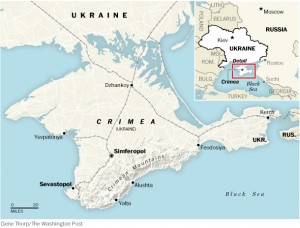In the first months of 2014, a popular uprising in the former Soviet republic of Ukraine led to the deposition of the Ukranian president and triggered an intervention of the Crimean peninsula by Ukraine’s neighbor, Russia. No one knows what’s going to happen next in Ukraine, but we can try to understand how we got to this point. What led to such deep and widespread discontent? What are the historical connections between Russia and Ukraine? How does Ukraine’s complex mix of ethnicities contribute to its sense of national identity? What role did economics and global geopolitics play?
Guest Charles E. King from Georgetown University discusses the state of Ukranian-Russian relations, and historical developments in Ukraine itself, before and after the breakup of the Soviet Union in 1991 to help us understand the situation in Ukraine today.
Guests
 Charles KingProfessor and Chair, Department of Government, Georgetown University
Charles KingProfessor and Chair, Department of Government, Georgetown University
Hosts
 Joan NeubergerProfessor of History, University of Texas at Austin
Joan NeubergerProfessor of History, University of Texas at Austin
Why don’t we start, if you could, with just a very brief explanation of where we are today. It’s the beginning of March (2014). How did we get here?
Things started last November, when there was a small demonstration in the city of Kiev, which is the capital of Ukraine, that was in favor of Ukraine’s signing a trade and association agreement with the European Union [when the government of Victor Yanukovych rejected that agreement]. That demonstration was violently broken up by the Ukrainian government, which in turn brought out even more people into the streets and more and more joined until the demonstrations got very large. In January and February those demonstrations turned violent—so violent in fact that they ended up growing even bigger in opposition to the Ukrainian government. Toward the end of February, on February 22nd, the demonstrators had taken over a number of government buildings, the president of Ukraine fled, and a new government was put in place. In response to that, a new government that tended to be more pro-western in its orientation, Russia invaded a portion of Ukraine called Crimea, in the south, stationed its troops there, in Crimea, claiming that ethnic Russians in Ukraine were under threat by this new, more pro-western Ukrainian government. That’s where we are today in the standoff.
OK, great, that’s where we are today. One of the things that makes this such a volatile situation is that Russia and Ukraine seem to be at odds—and Russia and Ukraine have had a very long history (sometimes being a part of the same country, sometimes not being a part of the same country)—could you fill us in on the background of the relationship between Ukraine and Russia.
It is a complex and long relationship. Vladimir Putin often refers to Ukraine and Russia as being “brotherly countries,” fraternal countries. They were of course part of the same country for most of modern history. First the Russian Empire, then of course the Soviet Union. The territory that’s in dispute at the moment, the area of Crimea in the south, this sort of diamond shaped peninsula that juts off of the bottom of the Ukraine in the Black Sea, only became part of solidly Ukrainian territory, in a legal sense, in 1954. When Ukraine was still part of the Soviet Union, the administrative status of Crimea shifted from the Russian component of the Soviet Union to the Ukrainian component of the Soviet Union. At the time, that internal administrative change didn’t matter much; after all, it was just changing the dotted lines inside the territory of one single country. But when the Soviet Union broke up in 1991, that administrative change came to matter a great deal, because then Crimea became part of the independent country of Ukraine in the early 1990s and was no longer part of the Russian Federation. And it’s that territory that’s in dispute right now at the moment.
And why is it so important to Russia? Why isn’t it just another little part of Ukraine?
Well it’s important for a couple of reasons. One: there’s a long history, partly mythical partly real, that ties Crimea to both Ukraine and to Russia itself. It was, according to tradition, the place where St. Vladimir first accepted Christianity in 988. A version of Orthodox Christianity from the Byzantine Empire to the south, that was the beginning of a civilization known as Kievan Rus, that flourished much farther to the north, in a city that is today Kiev, which is where the Ukrainians look back as the origin of their civilization. It was also the beginning of the Russian Orthodox Church. So both of these countries and cultures, in a way, look on Crimea as being historically important in their own national narratives.
But in a much more immediate way, Crimea is important for strategic reasons. There is a very important naval base there in the port of Sevastopol that has now been an issue between Russia and Ukraine. In the 1990s and early 2000s they managed to come to a really very workable agreement on sharing assets in this port. In 2010 a long term lease agreement was signed between Kiev and Moscow that allowed Russian forces, the Russian ships of the Black Sea fleet, to be stationed in this port even though the port was on Ukrainian territory. The ships are really lined up right next to each other inside the port. That has also been, in the current conflict, a source of struggle between Ukraine and Russia because Russia has essentially taken over all of the assets in that military installation.
Is the Black Sea fleet, the fleet that’s there in Crimea, critical to Russia’s strategic interests?
Well it is in the sense that it’s the largest Russian military base in warm waters—a more or less ice-free port all year round. It’s the rapid reaction force for the Russian Federation. If Russian ships or marines were ever to deploy into the Mediterranean, those ships would come through the Bosphorus and Sea of Monera and the Dardanelle Straights into the Mediterranean. It’s also, in Russian naval history, a very storied and important port. It was the central port that was attacked during the Crimean war in the 1850s. Tolstoy served on the battlements in the Crimean war. So it’s a thing that is tied to Russian naval history in addition to being a very important strategic asset for Russia right at the moment.
Ok, lets come back to politics for a second. So in 1991 the Soviet Union, the USSR, broke up. What kind of relationship did Ukraine and Russia have at that moment?
Well, interestingly, the relationship throughout most of the 1990s ended up being rather good in a way. You had a string of leaders in Ukraine who had come out of the Soviet experience who at the time, when Yeltsin was president in the Russian Federation, managed to get along and understand each other rather well. But what I think we’ve seen in the last ten years or so is a real generational change certainly in Ukraine, and perhaps to a lesser extent in Russia. You have a generation of politicians and certainly a generation of voters in Ukraine who were not schooled in the Soviet system, or at least didn’t come of age in the Soviet system. They think of themselves, in Kiev and Western Ukraine, as being Europeans, as being tied to Europe. They’re not a part of the same kind of old social network that, oddly enough, might have allowed a peaceful relationship between Russia and Ukraine to emerge in the 1990s. So I think that’s part of the shift in the cultural or strategic relationship between these two countries. In a way, the two societies have moved farther and farther apart. That’s certain. I think people live in two interpretive universes in much of Ukraine and in Russia these days, in part because of Russian state controlled media. But it’s also the case that political elites are really no longer a part of the same social network.
What was the Orange Revolution?
The Orange Revolution was a popular uprising in 2004, one of a number of popular demonstrations that were called in response to fraudulent elections. Political scientists sometimes talk about the way in which hybrid regimes, or competitive-authoritarian regimes, work. These are governments that are more or less authoritarian when it comes to issues like human rights or rule of law or a free media, but also manage to have elections. And that is in a way a dangerous middle ground for these governments because once you start having actual elections people expect that you will have free and fair elections. In 2004 it became very clear that in presidential elections the votes were being manipulated and there was a popular movement against the person who was elected at that time, Victor Yanukovych. The Ukrainian government had to backtrack and allow a competitor in those elections, a man named Victor Yushchenko, to come into power. The Orange Revolution produced, for a time, a much more pro-western government that was focused on eventual membership in the European Union, eventual membership in NATO. And that’s the moment, I think, when Vladimir Putin and the Russian government began to believe that western powers were manipulating Ukraine, using it strategically, to turn it toward the west, against Russia’s interests.
Let’s talk about the ethnic composition of Ukraine. It’s complicated, it’s changed a lot over the last century, and it seems to pose particular problems to political stability there now.
In a way that is certainly the case, that the ethnic situation is complex given that Ukraine is a multi-ethnic country. About 78% or so of the population describes themselves as ethnic Ukrainians, about 17% describe themselves as ethnic Russians, and then there are smaller populations of lots of other ethnic categories: Romanians, Crimean Tartars, Bulgarians, Poles, Hungarians, and others with much smaller numbers. But I think we can overstate the degree to which that’s a critical component of what’s going on right now, at least on the ground in Ukraine. It’s perfectly reasonable, both in Ukrainian history and today, for people to think of themselves as Ukrainian in an ethnic sense but be a native Russian speaker, or to be bi-lingual or tri-lingual. Maybe they speak multiple languages, Romanian, Ukrainian, Russian, or Crimean-Tatar, or other languages that have other cultural orientations. I think the real dividing line now is between those who feel the country’s orientation in the future should be toward Europe and the European Union, perhaps even NATO, and those who are kind of comfortable being where they are, in a kind of middle ground between Europe and Russia. So in other words, the divisions are more conceptual and political and strategic than strictly ethnic.
Let’s talk about the economy then. Can you give us a sense of what Ukrainian and Russian economic ties were during the USSR, how they’ve changed since 1991, and where we are now?
Well, of course when Ukraine and Russia were both part of the same country, the Soviet Union, they were intimately tied together. This was one market, one economy; factories that might produce goods in the Russian Federation relied on parts that were produced in Ukraine and vise versa. So these were intimately stitched together economies—in fact, a single economy within this country. Since then the Ukrainian economy has diversified, with imports and exports both to and from the European Union (even the United States). Russia remains a very big part of the Ukrainian economy, not least in the energy sector. A huge proportion, a vast proportion, of Ukrainian energy, gas for example, comes from the Russian Federation. It’s also the case that a sizeable amount of the natural gas that goes on to Europe comes from the Russian Federation through pipelines that come across Ukrainian territory. So the energy connections here between Russia, Ukraine, and Europe are fundamental. But right at the moment, the Ukrainian economy is in very dire straits. The value of the Ukrainian currency, hryvnia, is falling precipitously. The government is pretty close to broke, and that was one of the things, I think, that motivated the previous president, Yanukovych, who was just ousted by these popular protests in February. One of the things that motivated him to sign a large trade and economic support deal with the Russian Federation—it was the announcement of that deal and about fifteen billion dollars in Russian financial support, that caused even more protestors to come out into the central square in Kiev because they saw this as a kind of backtracking on Ukraine’s commitment to Europe. So the economy is intimately tied up with the way average Ukrainians are thinking about the situation.
Does the dependence on Russian oil make Ukraine kind of hostage to Russian power? Is the key issue?
Well it’s certainly the case that natural gas, in particular, is the major issue here and Ukrainians have talked for a long time about the need for energy independence—in fact, Europeans increasingly talk about the need for energy independence from the Russian Federation, given so much of the gas comes from Russia via Ukraine. So in a way all of these issues are coming to the floor and one of the things that has been discussed among US policy makers in recent days, in the midst of this crisis, has been ways of getting the US’s energy surplus, natural gas in particular, to Ukrainian consumers.
Are there any other issues that you think are key to understanding what’s going to happen in Ukraine?
One of the things that I think is most important is the way in which the Russian Federation has justified its intervention in Ukraine. The United States, of course, just in the last few days has denounced the transgression of Ukraine’s national sovereignty, the deployment of foreign troops on Ukrainian soil without the consent of the Ukrainian government. But to me, that’s not the key issue. Western powers themselves have transgressed national sovereignty when it has suited their interests. The key issue however, I think, is Putin’s justification for this. He has said that the reason for those troops going into Ukraine is the danger that the new government in Kiev presents to three categories of people Putin has named: Russian citizens; Russian speakers; and a very large, all encompassing, category that we might translate as compatriots, which is a term that you find the Russians using frequently to describe the group of people in Ukraine who have some kind of general cultural or linguistic orientation toward Russia. So this compatriot category is kind of a novelty. Russians often used it in the 1990’s to talk about the Russian Federation’s interest abroad, but this idea of a compatriot, sootechestvennik, is a novelty in international law. In fact, if you take that idea seriously, that Russia has a requirement, a right to protect compatriots wherever they might live, then if I were living in Brighton Beach in Brooklyn, I might fear a Russian invasion!
